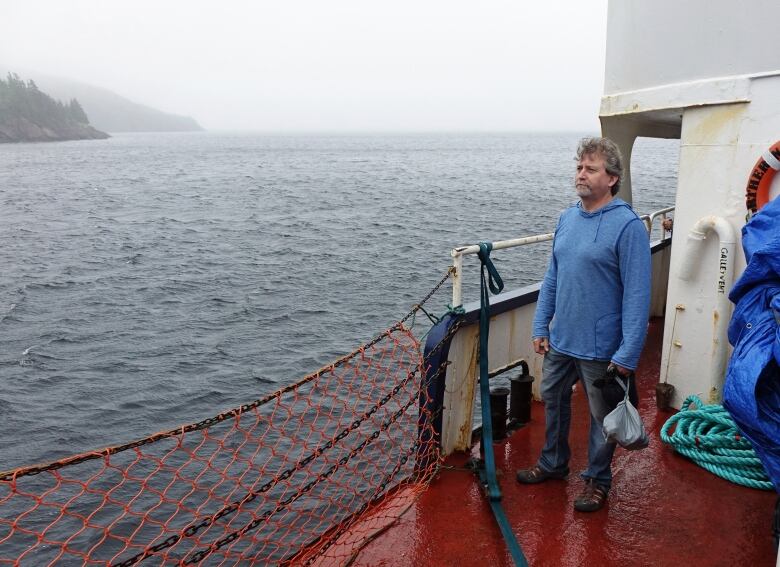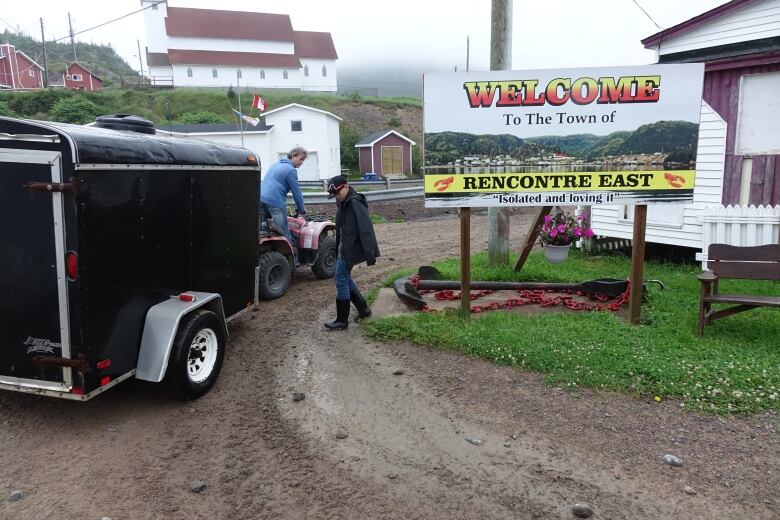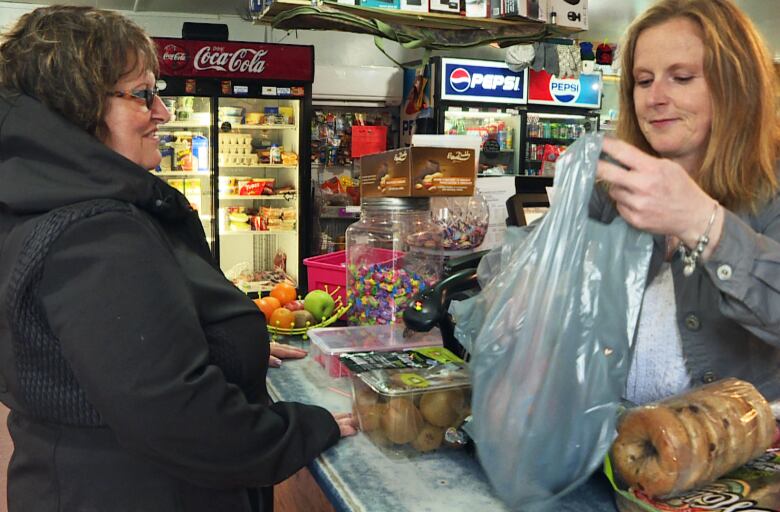Eat your veggies! How one Newfoundland outport is battling food insecurity
Rencontre East healthy corner store spearheading fresh food revolution in rural N.L.

It takes two hours by ferry to get to Rencontre East from the Burin Peninsula. On this particular trip a dozen people, heading home from overnight trips into nearby Marystown or distant St. John's, bob and sway in the roiling sea.
This isnot a journey they like to make too often.
Shawn Whiteway is steadier on his feet than most. He embarks twice a week, hauling goods for his general store, The Salt Box, in a trailer. Whiteway isn't keen on the rough passage either, but the nature of his cargo requires frequent outings.
Spinach and peaches don't last long on store shelves, after all.

"It's necessary," he said, shrugging off the time he spends on these grocery runs. "It's good, it's healthy, and we all need it."
Rencontre East, home to about 140 residentsmost of them rooted in the outport for generations has never had the customer base to support a full-service grocery store.
That's the rule, not the exception, in rural Newfoundland and Labrador.
By some counts, residents in 84per cent of communities have to drive out of town, sometimes for more thanan hour,to stock up on produce,meaning that packaged goods like pasta and canned soupare widespread staples.

Low consumption of healthy food, says Kristie Jameson, executive director of non-profit Food First NL, is a potentcontributing factorto diabetes and heart disease in Canada's unhealthiest province.
She believes that puts corner stores in the vanguard of food securitythoselike The Salt Box in Rencontre essential to public health.
Risky model
Turning corner storesinto small supermarkets doesn't always work.
When The Salt Box first tried it, at the behest of co-owner Deann Trainor, she found herself losing half her stock to the compost bin.Most of her customers would glance suspiciously at the shelvessome had never tried avocado or asparagus.
"It was hard to get people in town to actually go for it,"Trainorsaid. The vegetables she andWhitewayshipped in would brown and bruise, forcingTrainorto take home the waste and salvage what she could.
The solution? For Trainor, simple:apoints card that turned eating veggies into a game the whole outportnow wants to play. She doles out one point for each dollar spent on produce, keeping the tally cards in a box under her till.

Joyce Giovannini is this month's winner,the proud recipient of a wholefrozen chicken. But she's not the only beneficiary of the new system. Shesaid it seems like the whole town has spruced up their diets, especially families with younger kids.
Before The Salt Box began bringing in produce two years ago, Giovanninisaid she brought veggies over on the ferryherself once every two weeks.
"Everything's either gone or spoiled by the time you get out again," she said, recalling that canned green beans made up the bulk of her vegetable consumption back then.
Now, she buys tomatoes and peppers for spaghetti sauce, or lettuce for a Caesar salad dishes she says hergrandchildrenwant to devour.

Giovanninicredits the points system for adding healthy food to her daily shoppinglist."I don't know why, butyou buy more stuff, more often," she chuckled. "It used to be maybe twice a week, and now it seems like every day we have fresh vegetables and fruits."
A gaggle of the town's younger crowd isn't as impressed by the game. They'rewaiting outside, intent on getting their morning snack: yogurt and fresh berries, served in cups by Trainor and wolfed down in voracious silence.
Rencontre was always a fishing town, and even briefly a mining community. Today, most residents work on boats or leave for oil rigs. Some run small touring companies for wayward backpackers. The reliable presence ofsteak and salad has been a boon forthe bed and breakfasts in town, Trainorsaid.

For most of its history, residents subsisted on fish and root vegetables sturdy enough to weather weeks in storage. Trainor, who grew up in Labrador, remembers the limited choices typical of outports.
"It's not fair," she said, that the kids in the tiny town don't have access to cantaloupes or kiwis just because they don't live in an urban centre. "Not in today's society."
Is avocado a right or privilege?
Given the small and scattered population here, said Kristie Jameson, getting perishable goods to the outports presents a challenge.
So it's little surprise Newfoundland and Labrador has nearly triple the number of mac and cheese-laden corner stores than grocery stores, and more fast food joints than both of those combined a whopping 14 for every 10,000 people, according to Jameson.
But Jamesonsees a possible solution in those numbers. She thinks one of the province's biggest strengths lies in its community hubs: the takeoutsand small shopsthat serve each outport in lieu of farmers markets, butchers and grocers.

Community gardening, berry-picking and hunting are also on the table."We are starting to see people really want to connect back into that [tradition]," she said, pointing to a boom in grassroots food organizations in the last decade.
"We like to see it as the start of something we'd like to see more store owners realizing that power, that agency they have."
For Whiteway and Trainor, that power means lots of labour, planning and investment. But in their view, every ferry trip is worth the bounty.
"Everything grows. It takes time," said Whiteway."You can't plant a seed and expect to harvest it tomorrow."












_(720p).jpg)


 OFFICIAL HD MUSIC VIDEO.jpg)
.jpg)



























































































